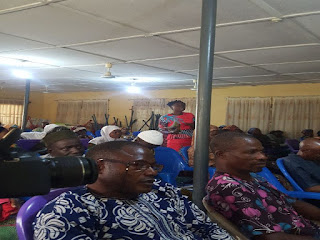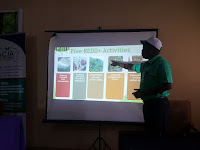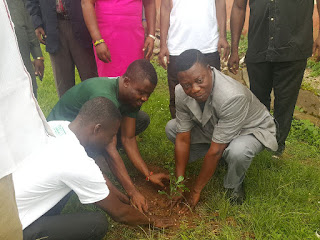MY TRIP TO ONDO STATE FOR A REDD+ PROJECT ON CAPACITY BUILDING AND ALTERNATIVE LIVELIHOOD TRAINING
 |
| Participants in front of Fadama Hall, Ondo State Ministry of Natural Resources |
According to the United Nations’ Food and Agriculture Organization, FAO (2018), deforestation continues at an alarming rate, an estimated 18 million acres (7.3 million hectares) of forest, roughly the size of Panama is lost each year globally. The annual rate of deforestation in Nigeria is 3.5%, approximately 350,000 - 400,000 hectares per year. Deforestation is Nigeria is going on at an alarming rate and is largely unchecked.
Some factors that contribute to deforestation and forest degradation are unresolved land tenure issues, inefficient forest law enforcement largely due to corruption, high level of poverty and little or no inclusion of forest dependent communities and local communities, and weak governance. Upon enquiries, I was also told that a huge part of the problem is that state governments give targets to and put a lot of pressure on the Forestry Departments in their respective states to generate revenue; infact, the reserved forests are being de-reserved by the states.
As a team member of the Climate and Sustainable Development Network of Nigeria (CSDevNet), I participated in a Capacity Building, Engagement Meeting and Alternative Livelihood Training for Osse River Park and Obada Communities On Redd+ And Climate Change Processes in Ondo State from 19th – 21st August, 2019.
 |
| Participants at the training session |
CSDevNet is the current sub-grantee of Pan African Climate Justice Alliance (PACJA), and recipient of additional finance extension of the Pan-African Forest Carbon Partnership Facility (FCPF) Capacity Building Program on REDD+ for CSOs and Forest Dependent Communities (FDCs). The project is supported by the FCPF through the World Bank.
The project was geared towards strengthening the knowledge of the local communities and forest dependent indigenous peoples from Ondo State in order to facilitate their active engagement and meaningful participation in the national REDD+ Processes.
To address some of the challenges to deforestation and forest degradation which I listed above, it is necessary to ensure that stakeholders acquire knowledge and enabling skills that will put them in a better position to protect their forests, and also enhance their livelihood as they embrace forest conservation. The training was set up for this reason.
At the beginning of the 3-day project, the CSDevNet team comprising of Mr Abuh Monday Steve, Mr Pius Oko, Ms Bolale Joshua, Ms Adesuwa Obasuyi, and the National REDD+ Secretariat team, Mr Tijjani Ahmad and Mr Richard Okibe, led by the Ondo State REDD+ Coordinator Barr Adesina David Dada paid a courtesy visit to the Ondo State Ministry of Natural Resources as part of the project activities and they were well received by the Permanent Secretary, Engineer Ajibola Ogidan who commended CSDevNet for sustaining the synergy built earlier, he also assured us of the commitment of the government to the project at all times and the readiness to render the assistance that is needed to meeting the project’s objectives.
 |
| Mr Abuh Steve and Ms Adesuwa Obasuyi of CSDevNet presenting communication materials to Engineer A. Ogidan |
The capacity building and alternative livelihood training took place at the Fadama Hall of the Ministry of Natural Resources, Engineer Ogidan representing the Honourable Commissioner of Natural Resources, Mr Temitayo Oluwatuyi, giving the welcome address stated that the capacity building and alternative livelihood training from CSDevNet is a great effort to enrich the community knowledge and experience sharing about REDD+ and climate change processes. He said that strengthening national capacity to manage the country’s forest resources will enhance socio-economic benefits, inclusive and gender-sensitive development of the forest communities, minimise conflicts, amongst others.
 |
| Barr Adesina David explaining REDD+ processes to participants |
Speaking on behalf of Mr Atayi Babs the National Network Coordinator of CSDevNet, Mr Abuh Monday extended greetings to the forest dependent communities from the CSDevNet Secretariat and thanked the entire people of Ondo State for their continuous efforts in conserving their forests. He stated that the Network will continue to foster the partnership in seeking to improve the livelihood options.
Addressing participants, Mr Pius Oko, the Project Officer of CSDevNet highlighted the project objectives of the project to include: facilitation of information and knowledge exchange on REDD+ and climate change processes; capacity building and linkage between government, CSOs and institutions and forest dependent communities to inform, educate, and sensitize women, and youth for sustainable management of natural resources; and to emphasize on the five REDD+ thematic areas: reducing emissions from deforestation and forest degradation, conservation of forest carbon stocks, sustainable management of forest and enhancement of forest carbon stocks, and regeneration as a way forward for sustainable forest management.
Mr Tijjani Ahmad representing the National REDD+ Coordinator Dr Moses Ama said REDD+ is a national project which depends on the passion for sustainable forest management and the interest of the states are key to the success of the project. “It is not possible to tell forest dependent communities to conserve their forests without giving them alternative sources of livelihood”, he said.
According to Alhaji Yusuf from Obada Community, “This project has enlightened our community members on the importance of sustainable forest management and also created a link that will enable us to work with the government, other local community groups and International CSOs like CSDevNet.”
 |
| Training on cassava processing at the Aramson Cassava Processing Centre |
Participants were trained on diversification and value addition to cassava and palm oil by Mrs Odedeyi Elizabeth Funmilayo and Mr Bobade Adebayo, upon completion of the training sessions, Osse River Park and Obada Community members visited the Aramson Cassava Processing Center, along Federal Secretariat Road, Akure for practical experience and knowledge on cassava processing.
 |
| Women planting trees at the symbolic tree planting ceremony |
 |
| Symbolic tree planting ceremony on Day 3 |


Comments
Post a Comment